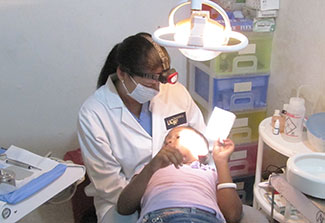
Profile: Fogarty Dental Fellow Lilliam Pinzon studies Mexican children with HIV
July / August 2016 | Volume 15, Number 4

Photo courtesy of Dr. Lilliam Pinzón
Fogarty Fellow Lilliam Pinzón studied cavity treatments in
Mexican children with HIV and held a symposium to increase
sensitivity toward people infected with the virus.
Mexican children with HIV and held a symposium to increase
sensitivity toward people infected with the virus.
By Cathy Kristiansen
When dentist Dr. Lilliam Pinzón looked into the mouth of a 5-year-old child, she saw 15 of his teeth had cavities. As with all her patients in Tijuana, Mexico, the boy had HIV and was enrolled in her study testing which of two dental filling compounds was more appropriate for underserved children.
“The patients, especially because they’re HIV-positive, have not been treated at an early age, so they have a lot of decay,” Pinzón recalls. “Even if they have money, when they’re HIV-positive, health professionals don’t want to see them.”
Pinzón was in Mexico for her fellowship with Fogarty’s Global Health Program for Fellows and Scholars, which provides a yearlong mentored clinical research experience abroad for postdoctoral fellows and pre-doctoral scholars. NIH’s National Institute of Dental and Craniofacial Research (NIDCR) supported Pinzón fellowship.
Her patients are enrolled in a study to compare a traditional metal-based amalgam filling compound with a newer glass ionomer material that bonds to teeth and releases fluoride over time, to see which is more cost-effective and better suited to children with HIV.
“Fluoride stimulates re-mineralization of the tissue and stops the number of bacteria in the mouth, acting as both a preventive and curative treatment,” Pinzón explained. “This is very good specifically for the HIV population, because the virus can cause dry mouth, so they have less saliva to protect their teeth against cavities.”
Glass ionomer cavity treatment is applied using hand-held instruments, rather than noisy drills, making it more economical and less traumatic for patients, she said. The treatment is administered under local anesthesia and doesn’t require water or electricity. But the technique is not routinely taught at dental schools in Mexico. To overcome that obstacle, Pinzón has used part of her grant to train Mexican dentists.
Pinzón’s study also included a 60-question survey to look for cavity risk factors, such as poor diet and hygiene. The study showed stigma also contributed by discouraging patients from seeking free health services. Others relapsed into a drug habit or abandoned antiretrovirals because of short-term side effects. “They are not a very stable population in terms of their treatment and lifestyle,” she said. Also, there is a lack of knowledge of HIV/AIDS among the infected population and health professionals in Mexico. In many cases, patients - and medical students - conflate HIV and AIDS. “The patients think they’re going to die and what’s the point of taking medicine?” Pinzón said.
The need for more attention to this population is urgent, she said. “It’s really important for the United States to invest in research in this area, which has a huge HIV epidemic. Global health is also related to homeland security. We see a lot of people who go over the border for sex and drugs and come back to the U.S. infected.”
To increase dental professionals’ understanding of infected patients, Pinzón collaborated with mentor and Fogarty grantee Dr. Joseph Zunt to obtain funding for a workshop in Mexico to train junior faculty and for a public symposium for faculty, students, staff and others connected to the HIV community. Pinzón said, “There is a huge lack of education starting from the patients all the way to people that are treating them.”
Pinzón says she decided to become a dentist by age seven. After completing dental school in Colombia, she pursued a postdoctoral fellowship at the University of California, San Francisco (UCSF). “I didn’t want to be a general dentist, but one who develops new things, creates new possibilities to improve dentistry,” she recalled. “It was always a dream that I had.”
Pinzón, who now has academic posts at UCSF and at the University of Utah, said she developed many skills during her fellowship, in addition to learning about study design, methodology, data analysis and other research techniques.
She said working with HIV-positive patients opened her eyes to their suffering and increased her determination to help. “It made me more sensitive to their needs, what they face every day,” she said. “Even though they have an infection, they are still people and deserve respect. I think I can make a difference in their lives and give them a little bit of love, not just dental treatment.”
More Information
- Learn more about the Global Health Program for Fellows and Scholars.
- Featured profiles of Fogarty Fellows and Scholars.
To view Adobe PDF files, download current, free accessible plug-ins from Adobe's website.


































No hay comentarios:
Publicar un comentario